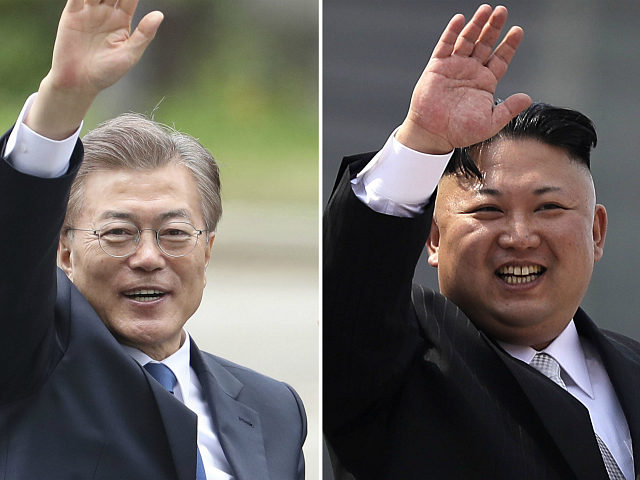South Korean politicians and analysts are divided over North Korea’s proposal for a summit between dictator Kim Jong-un and South Korean President Moon Jae-in in Pyongyang.
Some are supportive of the idea or, at least, think it is worth a few days of President Moon’s time, while others believe the summit could be counterproductive or even dangerous.
Korea Joongang Daily finds Moon in a “tough spot” because Moon campaigned on a platform of opening up relations with North Korea, only to be pushed into a more hawkish posture by Pyongyang’s constant provocations. The Moon government has reportedly been preparing for the possibility of high-level talks ever since North Korean dictator Kim’s surprisingly conciliatory New Year’s address.
And yet, Korea Joongang Daily notes that Moon did not immediately accept the invitation to a summit delivered by Kim Jong-un’s sister Kim Yo-jong, instead expressing hopes that North and South Korea could “create the environment for that to be able to happen.” He is also said to have told Kim Yo-jong that North Korea must seek dialogue with the United States.
Some South Korean analysts find Moon equally wary of losing this diplomatic opportunity with North Korea and annoying the United States, which wants its allies to stand firm against North Korea’s effort to break up the international coalition against it. Some find Moon admirably cautious to be used in another meaningless, time-wasting diplomatic gambit by Pyongyang. Others think the summit offer from North Korea was a sign of desperation as sanctions hit the regime hard.
Yonhap News quotes Rep. Choo Mi-ae, leader of the majority Democratic Party, welcoming North Korea’s proposal as a “meaningful starting point toward the denuclearization of the Korean Peninsula” and hailing it as “the biggest achievement of the Pyeongchang Olympics,” provided the meeting takes place as envisioned.
“Although there may be disagreements and concerns at home and abroad, what’s clear is that peace stems from dialogue and it’s impossible to oppose dialogue if we want peace,” said Choo.
Justice Party representative Lee Jeong-mi said the summit would “firmly show to the world that the Korean Peninsula has chosen peace over war,” and vowed “utmost support for the government’s efforts.”
However, opposition Liberty Korea Party spokesman Rep. Chang Je-won criticized President Moon for not pushing harder on denuclearization while Kim Jong-un’s sister was in South Korea.
Chang warned that if Moon visits North Korea without a firm commitment to denuclearization, it would be “nothing more than a congratulatory delegation” celebrating Pyongyang’s emergence as a nuclear power and would “amount to an enemy-benefiting act.”
“We should firmly keep in mind that any talks where denuclearisation is not a precondition only buy North Korea more time to complete its nuclear capabilities while they fool us with their peace offensive facade,” Chang said firmly.
Another opposition leader, Yoo Seong-min of the Bareun Party, advised Moon to “put maximum sanctions and pressure on the North” and resume joint military exercises with the United States on schedule after the Olympics, a move that would be bound to irritate Pyongyang.
“If we’re going to have an inter-Korean summit without resolving the North Korean nuclear issue, not doing it would be more helpful to our security,” said Yoo.
Yoo’s advice was consistent with U.S. Vice President Mike Pence’s take on the North’s offer of a summit meeting.
“The point is, no pressure comes off until they are actually doing something that the alliance believes represents a meaningful step toward denuclearization,” Pence said on Sunday. “So the maximum pressure campaign is going to continue and intensify. But if you want to talk, we’ll talk.”
“We’ve said for some time it’s really up to the North Koreans to decide when they’re ready to engage with us in a sincere way, a meaningful way,” added U.S. Secretary of State Rex Tillerson. “They know what has to be on the table for conversations.”
“A White House official said although Moon did not discuss the invitation with Pence, the South Korean president made it very clear that only when North Korea actually starts to take steps to denuclearize would anyone even consider beginning to take the pressure off,” Reuters reported over the weekend.
Some see the hesitation by South Korean officials to embrace North Korea’s summit offer as essential Seoul waiting for approval from Washington before proceeding, but it’s not just the American administration voicing deep suspicions. Japanese Foreign Minister Taro Kano, for example, warned the international community on Monday not to fall for North Korea’s “charm offensive.”

COMMENTS
Please let us know if you're having issues with commenting.